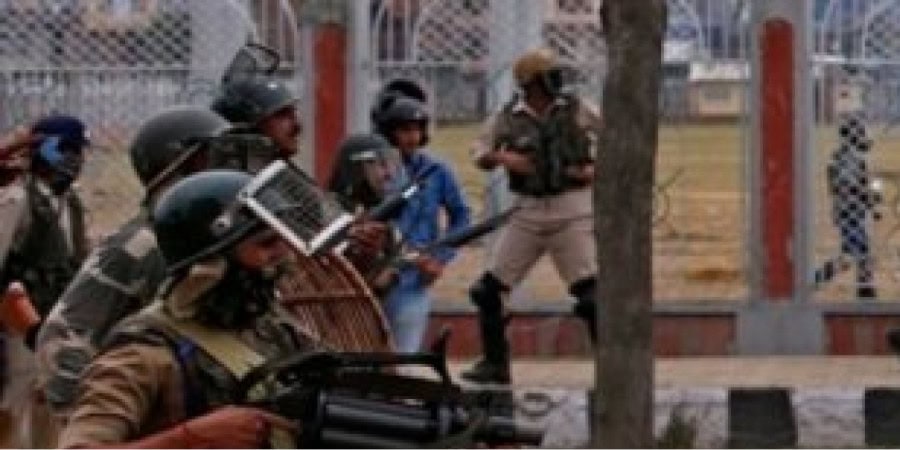Muhammad Raafi
Even as the Jammu and Kashmir administration has ordered a magisterial inquiry into a recent “shoot-out” that led to the killings of civilians, legal experts in the Valley believe that such magisterial inquiries are turning out to be a farce.
Hundreds of magisterial and SIT (special inves-tigation team) inquiries have been conducted in Jammu and Kashmir for the past three decades, but the reports of a majority of them have never been made public.
Since 2008, various governments and admini-strations have ordered 108 such inquiries into vari-ous incidents of violence in the Valley, including custodial killings, beatings, rape and molestation, ransacking of houses, harassments, human shields, pellet injuries and fake encounters, a representative of Jammu Kashmir Coalition of Civil Society, a local human rights group, said. However, there has not been any conviction following these probes.
Another local human rights group, International Forum for Justice and Human Rights filed a petition before the State Human Rights Commission in 2018 seeking details about magisterial inquiries ordered since 1990.
“The Commission in its response said that over 500 magisterial inquiries have been ordered, of which only one inquiry was completed and the re-port was never submitted,” Muhammad Ahsan Un-too, the chairman of the Forum said.
Futility of inquiries The Kashmir region wit-nessed three public unrests in 2008, 2010 and 2016.
In 2008, Kashmir was ruled by a coalition of Jammu and Kashmir Peoples Democratic Party and Congress.
The erstwhile state was ruled by a coali-tion of the Jammu and Kashmir National Confer-ence and Congress in 2010.
In 2016, a coalition of Jammu and Kashmir Peoples Democratic Party and Bharatiya Janata Party ruled Jammu and Kashmir.
On May 26, 2008, the Indian government and the state administration of Jammu and Kashmir agreed to give 99 acres (0.40 sq km) of forest land in the Kashmir Valley to the Shri Amarnath Shrine Board (SASB) to build temporary shelters and fa-cilities for Hindu pilgrims.
This sparked a debate with protesters in the Kashmir Valley opposing the land transfer, and protests in the Jammu region in support.
Over 50 people were killed in various inci-dents of firing and tear smoke shelling by the local police and paramilitary forces.
The government ordered eight magisterial inquiries. However, no one had been convicted, Untoo said.
In 2010, protests were witnessed in Kashmir for around four months, after the Indian Army claimed to have killed three “Pakistani infiltrators” in a “staged encounter” at Sona Pindi.
According to eyewitnesses, a territorial army soldier, a counter-insurgent and a former special police officer took three young men from Nadihal village in the Bara-mulla district and killed them.
The local police and Indian paramilitary forces used tear gas, rubber bullets and fired live bullets killing 112 people, including numerous teenagers and a 11-year-old kid.
The government ordered at least 14 magisterial probes, constituted special investigation teams of police to probe the various incidents of killings and firing incidents. However, no one has been con-victed.
Starting from 11 inquires in 2011, eight in 2012, seven each in 2013 and 2014, 10 inquires in 2015 were ordered by the government.
In 2016, Kashmir witnessed another massive public unrest after the killing of popular militant commander Burhan Muzaffar Wani.
Over a hundred civilians were killed mostly in south Kashmir when the police and paramilitary forces used force to quell the protests.
The coalition government of the Peoples De-mocratic Party and Bharatiya Janata Party led by Mehbooba Mufti ordered eight probes. Again, there have been no convictions. Seven inquiries in 2017 and eight inquiries in 2018 were ordered.
“These inquiries do not inspire much public confidence because of the track record of the state here. The forces enjoy impunity under various laws.
In the past, we had seen inquiry reports indicting forces, but they were never not acted upon,” Habeel Iqbal, a Kashmir-based lawyer, said.
In 2014, former Jammu and Kashmir chief min-ister Omar Abdullah announced the CoI (Commis-sion of Inquiry) ahead of the assembly elections in November and December of that year.
The Commission was announced after four ci-vilians were killed by CRPF personnel in the Ga-gran area of South Kashmir’s Shopian district in September 2013 while renowned music conductor Zubin Mehta was performing in the famed Mughal Gardens of the Srinagar city.
Omar’s announcement was seen as an attempt to reclaim the lost ground following the public outrage over security forces’ excesses during the 2010 car-nage in the region.
Iqbal said although the commission indicted the CRPF and the report was sent to the home depart-ment, it was never made public. “The victims’ fami-lies sought the copy of the report from the home department but were never given one.”
According to Iqbal, one of the reasons why these inquires “fail” is because some laws come in support of culprits.
Citing an example, he pointed out that in the case of Amshipora fake encounter, the inquiry had indicted the army personnel, how-ever, the Armed Forces Special Powers Act came to their rescue.
The Amshipora fake encounter took place on July 18, 2020 in Amshipora village of Shopian dis-trict when three Kashmiri labourers, one of whom was a minor, were killed by the Indian army.
Retired Justice Hasnain Masoodi, a former judge of the Jammu and Kashmir high court and the sitting parliamentarian of the National Conference from Anantnag constituency, said that the victims were “skeptical” of magisterial inquiries and were “doubtful” of their outcome.
Lack of trust Magisterial inquiries fail because they are not open inquiries like judicial inquiries.
“It is essentially the question of trust. The mag-istrate who conducts the inquiry is part of the gov-ernment, the system. However, the fact of the matter is these grievances are against the government,” he said.
—Courtesy The Wire
[Muhammad Raafi is a journalist based in Kash-mir and tweets @MohammadRaafi.]










